MIAMI — During a Sunday sermon in mid-February, Pastor Dionny Báez shared an omen with his congregation.
“I believe that God is going to do something very great with the Latino people in the United States,” he said.
The congregation responded with applause and remained attentive to the rest of the morning evangelical service held weekly in an old nightclub.
The message evangelical leaders give churchgoers during a presidential campaign is a valuable key to understanding where the evangelical voting bloc is headed.
“We are heads of communities, right? There are literally thousands of people who are influenced by our word,” said Báez, founder of the H20 Church, in an interview with Noticias Telemundo.
Baez said his priority when supporting a candidate is that they’re aligned with his values. He advised others to do the same when they ask him for guidance on the November contest.
Evangelicals are a conservative bloc of the Hispanic electorate that is “more involved than ever” in the elections, said evangelical Pastor Samuel Rodríguez, president of the National Hispanic Christian Leadership Conference (NHCLC), which touts itself as the largest Hispanic Christian organization worldwide with over 40,000 churches in the United States alone.
“Evangelical Latinos this year are going to vote like no other year,” Rodríguez said. The security of the country and the economy, parental rights, the free expression of religion and the rights of Christians are the issues that are mobilizing them the most in this election cycle.
In the U.S., around 10 million Hispanics identify as evangelical or Protestant and “approximately three in ten Hispanic Republicans (28%) consider themselves evangelical Protestants,” according to the most recent figures from the Pew Research Center.
For decades, U.S. evangelicals have solidly been part of the electoral base of the Republican Party, which defends their conservative positions on abortion and other matters. As conservative Republicans continue to court these voters, their vow to align their political agenda with Christian values has become more frequent and explicit.
A growing support for Christian nationalism
During the National Convention of Religious Broadcasters held at the end of February in Nashville, Tennessee, the packed auditorium burst into applause when former President Donald Trump said, “We have to get our religion back, we have to get Christianity back in this country.”
“No one will touch the cross of Christ under the Trump administration, I swear,” Trump said, after falsely claiming that there’s religious persecution against Christianity in the U.S.

Trump’s rhetoric is linked to the ideology of Christian nationalism, which calls for America to be an unequivocal Christian nation in its laws and customs, and whose adherents don’t believe in a separation of church and state.
This system of religious and identity beliefs has permeated among Hispanics who belong to evangelical and Protestant churches.
Though the majority of Americans (67%), reject or are skeptical of Christian nationalism, it resonates strongly with two religious groups: 66% of white evangelicals and 55% of Hispanic Protestants, who say they support or sympathize with this movement, according to a 2023 American Values Atlas survey conducted nationwide by the nonpartisan Public Religion Research Institute (PRRI).
The survey interviewed over 22,000 adults in 50 states, measuring respondents’ affinity for the following statements: the U.S. government should declare America a Christian nation; U.S. laws should be based on Christian values; if the U.S. moves away from our Christian foundations, we will not have a country anymore; being Christian is an important part of being truly American; and God has called Christians to exercise dominion over all areas of American society.
Hispanic Protestants were the only religious group that saw an increase in support for Christian nationalism, growing by 12% between the first survey in 2022 and 2023.
By contrast, levels of acceptance for Christian nationalism were significantly lower among other religious groups: 75% of Hispanic Catholics and 92% of American Jews don’t identify with these ideas.
The survey found that among whites and Hispanics, but not among Black Americans, “holding Christian nationalist beliefs is strongly correlated with Republican Party identity and support for Trump.”
Religious leaders as well as Christian nationalism scholars warn that Christian nationalists seek to exert their beliefs on all aspects of government and society, believing such is the will of God.
‘An ideal world’
A few weeks before the PRRI report was published, Noticias Telemundo attended an evangelical service in Miami led by Báez to report on the Latino evangelical vote.
Though Baez and members of the congregation were not asked specifically about the term Christian nationalism, they were asked about their concerns and priorities ahead of the November election and the role of religion played in their political stance.
When Baez was asked whether the laws of this country should be based on Christian values, he said, “That would be an ideal world, an ideal world because they are my values, it is my way of thinking, it would be beautiful because I believe that the integral Christian foundation helps the development of the human being.” But Baez added that it’s important to respect others’ way of thinking as well as their values.
For Osmani Martínez, a Cuban Christian who plans to vote for Trump, “it would be very good if the state and the church became one,” he said.
Elizabeth Rodríguez, who is Puerto Rican, has worked for many years with the Democratic Party. In addition to her Christian faith, who she chooses on the ballot, she said, will also be influenced by what candidates propose a plan for the “well-being of my community, for the well-being of the family.”
She advocates freedom and democracy, but said there should be a system where God is included.
Félix Córdova, who is Mexican, has been attending the H20 church where he feels “the presence of God.” He hopes to be able to participate in the November election after passing his citizenship exam. If he votes, he said, it will be for Trump “because he has made a difference, he continues to make it, he is a man who bends the knee and asks the Father for direction.”
Córdova considers himself spiritual, is not in favor of abortion and believes that the Republican Party maintains Christian values in a world that, he said, is out of control. For him, spiritual education should be the source of support for American laws.
Raising concerns
Carlos Malavé, president of the Latino Christian National Network, believes a lack of education about Christian nationalism and its political connotations has allowed many Hispanics to be indoctrinated with these ideas. He believes Latinos embrace this rhetoric without realizing that it attacks their community.
“When you generally ask the public, in churches, what Christian nationalism is, people cannot give an answer,” he said. Malavé belongs to Christians Against Christian Nationalism, a group of religious leaders that denounce this ideology as a threat to American democracy and a distortion of the Christian faith.
The Protestant reverend, who was born in Puerto Rico, said that the ideology’s undercurrent of racism and patriarchy can facilitate a marginalization of vulnerable groups or minorities, including immigrants. “A magnificent job has been done by groups that are extremists to convince even the immigrants themselves that the new immigrants are a threat,” Malavé said.
Malavé said Christian nationalism, which erases the separation of church and state, is based on the supremacy of white culture and the supremacy of Christianity over other religions.
Christian nationalists proffer that the U.S. has been and always should be Christian, from the top to the people, according to the group Christians Against Christian Nationalism. In addition, it carries “assumptions about nativism, white supremacy, authoritarianism, patriarchy and militarism,” Malavé said.
In their book “Taking Back America for God,” which delves into how this ideology is increasingly trying to win over conservative Latinos, Andrew Whitehead and Samuel L. Perry argue this is a line of thought that prevails among the followers of Trump.
“American Christian nationalism is a worldview based on the belief that the United States is superior to other countries and that that superiority was divinely established,” said Samuel Perry, associate professor at Baylor University, a private Christian academic institution in Texas, in an article on the specialized site “The Conversation.”
“In their minds, only Christians are true Americans,” he notes.
According to Perry, although most Christian nationalists do not commit acts of violence, the ideology “suggests that unless Christians control the state, the state will suppress Christianity.”
“Most of this misinformation and lies that are being perpetuated come from radical Republican groups,” Malavé said.
Efforts to raise awareness in the Latino community about the implications of this rhetoric are underway, but face major challenges.
Wrestling with immigration positions
Báez says he initially admired Florida Republican Gov. Ron DeSantis’ proposals, especially those aimed at restricting the discussion of gender identity and sexual orientation with younger children in public schools, but became disenchanted with the presidential hopeful when he displayed an anti-immigrant position.
Báez sees Christian Latinos at a crossroads when it comes to going to the polls, since the party that defends its religious principles — the Republican Party — also promotes the most anti-immigrant policies and rhetoric.
“What do I say to my congregation? I really tell our people that more than immigration reform or help for people who are entering illegally — we must focus on the values that reflect who we are as a Christian community,” he said.

In California, Pastor Samuel Rodríguez said that he’s also concerned about the anti-immigrant positions of most conservative Republicans: “I don’t like it because sometimes the rhetoric is nativist and racist and I don’t deny it.”
However, he’s convinced that without Christianity there is only anarchy, chaos and darkness. That is why he believes that many Christian Latinos no longer support the Democratic Party, particularly for defending abortion.
“Let them continue with that strategy to see if it works for them,” he said.
Rodríguez said that the U.S. was founded under a Judeo-Christian platform, but when asked whether it should legislate with those values as a guide, he said, “We are not a theocracy.”
For some far-right politicians, such as the Republican congresswoman for Colorado Lauren Boebert, the separation of state and church “is garbage.”
“The church is supposed to lead the government, not the government is supposed to lead the church,” she said in July 2022.
“We should be Christian nationalists,” said Georgia Republican Rep. Marjorie Taylor Greene, who insisted that Christian nationalism should not be feared because it could solve school shootings and “sexual immorality” in the country.
In early February, a convoy organizedfor a “Take Our Border Back” rally demonstrated at the southern Texas border, attracting Trump supporters and Christian nationalists who carried crosses and were baptized as they gathered to support hard-line border enforcement.
An earlier version of this story was first published in Noticias Telemundo.
Source: | This article originally belongs to Nbcnews.com









